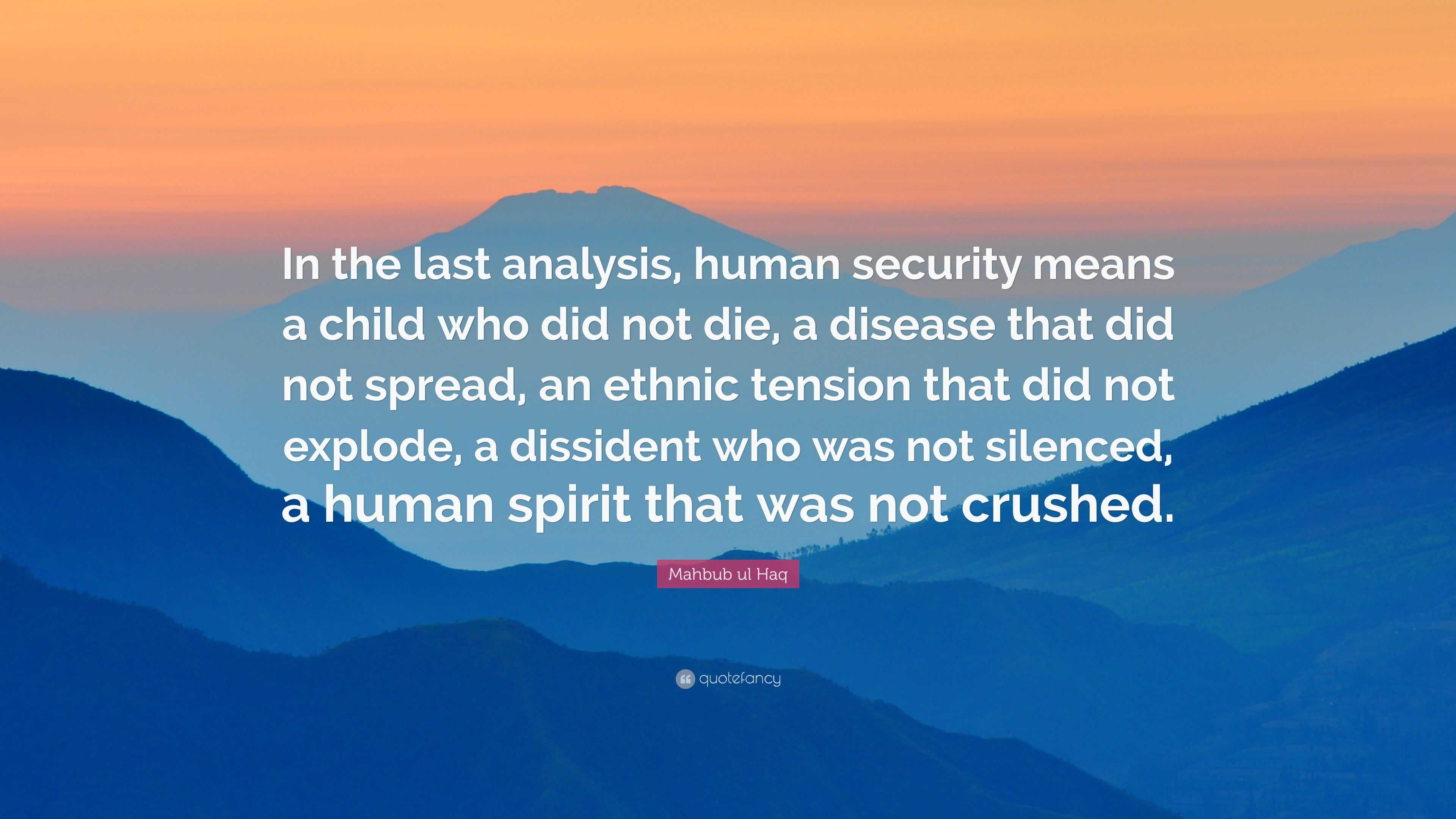Concept of Safety and Security
By Shucheesmita Simonti
 |
| Image source: QuoteFancy |
The term 'security' is more pronounced in international organizations and international legal instruments. Generally, late economist Mahbub-ul-Haq (1994) is considered to have founded and outlined the concept of human security in his paper, ―New imperatives of human security (1994).
Mahbub-ul-Haq (1994) is considered to have founded and outlined the concept of human security in his paper, ―New imperatives of human security‖ (1994).
Concept of human security advanced by Mahbub-ul-Haq
According to Haq (1994), the notion of human security can be classified into the following categories:
1. Economic Security: Economic security requires an assured basic income.
2. Food Security: Food security means that all people at all times have both physical and economic access to basic food.
3. Health Security: ―While poor people in general have less health security, the situation for women is particularly difficult. One of the most serious hazards they face is childbirth.‖
4. Environmental Security: The environmental threats are a byproduct of degradation of local ecosystems…In developing countries, water crisis is one of the common forms of environmental security.
5. Personal Security: According to the report, the threats ―take several forms:
Threats from the state (physical torture)
Threats from other states (war)
Threats from other groups of people (ethnic tension)
Threats from individuals or gangs against other individuals or gangs (crime, street violence)
Threats directed against women (rape, domestic violence)
Threats directed at children based on their vulnerability and dependence (child abuse)
In case of personal security, Haq (1994) also draws attention to gendered dimensions of personal security:
Among the worst personal threats are those to women. In no society are women secure or treated equally to men. Personal insecurity shadows them from the cradle to the grave. In the household, they are the last to eat. At school, they are the last to be educated. At work, they are the last to be hired and the first to be fired. And from childhood, through adulthood, they are abused because of their gender.
6. Community Security: Community security threats can arise within the community or from rival communities. Community security threats are, despite the source, as a result of affiliation to a particular religious or ethnic community.
This article is extracted from the Research paper titled 'Gender Based Violence and Subsequent Safety Challenges experienced by Rohingya Women' in Chapter 3 of the Safety Report by SAFIGI Foundation 'Safety First for Girls'.
The Safety Report by SAFIGI is a two-fold Open research on 'Core Issues Affecting Safety of Girls in the Developing World.' The first part of the Safety Report is a Research Paper. The second part is a detailed Data Analysis.
The Safety Report Research paper is titled: 'Core Issues Affecting Safety of Girls in the Developing World.' The paper starts with an abstract before focusing on subjects in the key regions of Africa, Asia, and the Americas. A total of 7 Research papers make up the safety Report (sans the introduction and conclusion), including:
- The psychological effect of mass sexual harassment on girls in Egypt (P.24) by Heba Elasiouty.
- Safety concerns in relation to social media: Growing up female in an increasingly digital world (P.45) by Karin Temperley.
- Psychosocial challenges faced by parents raising children with physical disabilities in Oshana region (P.68) by Misumbi Shikaputo.
- Gender-based violence and subsequent safety challenges experienced by Rohingya women (P.119) by Shucheesmita Simonti.
- LGBT policies and overall safety in Brazil (P.141) by Alinne Lopes Gomes.
- Silent voices‘: Violence against the female body as consequence of machismo culture (P.177) by Steffica Warwick.
- America‘s Public Policy on Sexuality: The Repression of Girls in Vulnerable Populations (P.208) by Dr. Christina Sisti.
The Safety Report Data Analysis is titled: 'Core Issues Affecting Safety of Girls. Results and Outcomes based on Zambia, Egypt, USA, Tanzania, South Sudan, and Namibia.'
SAFIGI Outreach Foundation Ltd, a volunteer-based and youth led NGO registered in Zambia, implemented the Safety Report in order to understand the multifaceted concept of safety and how it applies to the female gender in diverse settings. And therefore, further prove safety is intrinsic, and that vices in society stem from an intimate level of the human being before its manifestation. This way, when we create safety solutions, whether it be in a developing nation, conflict zone, refugee camp, or patriarchal society, the problem is resolved from a deeply rooted cause. Such that, we treat the disease itself and not mere symptoms.
This study is as a result of collaborative effort pursued in the spirit of volunteerism via UN Online Volunteers.


Comments
Post a Comment